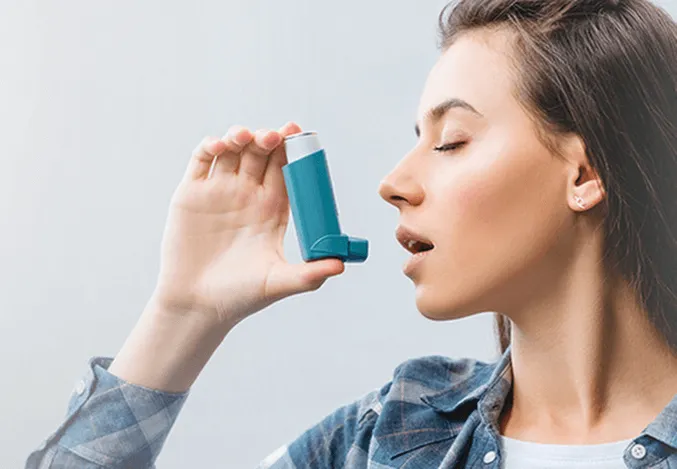Buy Asthma Inhalers Online UK
Your asthma treatment will be decided by our prescribers based on your medical assessment. You will be asked to select an metered-dose asthma inhaler option from a list after completion of your medical assessment.
What is Asthma?
Asthma is a long-term chronic lung condition caused by inflammation in the airways. It usually affects people from childhood but can also develop later in life. It affects the lung airways that carry the air in and out.
In the UK, around 5 million people have asthma symptoms. Asthma sufferers include 1 in every 11 children and 1 in every 12 adults.
Asthma patients have sensitive airways. People diagnosed with asthma, react to certain allergens. This reaction causes inflammation of their airways. This triggers a constricting action of the muscles around the airways leading to wheezing and a tight chest.
With severe asthma, there can also be a build-up of mucus, which often causes a cough. This causes breathing problems which can range from mild to fatal if left untreated.
How effective is the Asthma treatment?
The two most common asthma treatment options available is either the reliever inhaler or a preventer inhaler. Reliever inhalers stop your initial asthma symptoms. They also prevent them from developing into full-blown asthma attacks. The cells within the lungs absorb the medication. Using your Ventolin inhaler reduces any allergic reaction. It also reduces the constriction of the air passages in asthma conditions.
Preventer Inhalers are a long-term, daily treatment. They relax the airways and keep them open. This stops symptoms and attacks from occurring. It works even if the patient comes into contact with asthma triggers like pollen. They only prevent asthma symptoms when taken daily as directed. If you stop using them, your breathing issues will return. You can buy a reliever inhaler for quick relief during an asthma attack online in the UK. You can also buy a preventer inhaler online in the UK.
How does an Asthma Inhaler work?
Asthma inhalers, also known as an reliever inhalers are often prescribed in asthma action plans. The Ventolin inhaler (reliever inhaler) manages and works particularly well during an asthma attack. The ventolin inhaler works in the following way:
-
The ventolin inhaler gives you a specific dose of medicine into the lungs.
-
Ventolin contains bronchodilators like albuterol.
-
Bronchodilators are common in dry powder inhalers. They widen the airways and ease breathing difficulties during an asthma attack.
-
The medication in the inhaler relaxes the muscles surrounding the airways.
-
The ventolin inhaler, also known as the blue inhaler is effective for managing sudden asthma attacks.
-
It prevents the constriction of the airways. This allows for improved airflow and reduced symptoms.
Asthma treatment options
Reliever Inhaler: Quick relief
Reliever inhalers provide quick relief from asthma symptoms. This inhaler contains a medicine known as a short-acting beta2-agonist. It relieves the muscles surrounding the airways.
Asthma triggers muscle restriction. Once settled, the airways return to their normal state, making breathing much easier. When asthma strikes, please consult our GP, who will give you a reliever inhaler. The available short-acting asthma treatments are Salamol, Ventolin, and Bricanyl. Some Ventolin inhalers are available for those with an asthma action plan. They have color-coded components, which help users identify and use the inhaler.
Preventer Inhaler: Long-term relief
Preventer Inhalers prevent symptoms and reduce inflammation in the airways, preventing asthma attacks from occurring over time. People use preventer inhalers to manage their asthma symptoms on a daily basis.
It is important to use the preventer inhaler as prescribed by the doctor. You should take the daily dose even if you do not experience an asthma attack.
The long-acting beta-2 agonists in preventive inhalers help relax your airway muscles. It helps people with asthma to breathe. The preventer asthma inhalers include the following are
- Clenilm Seretide
- Symbicort
- Flixotide
- Serevent
- Atrovent
- Qvar
Combination Inhalers with Corticosteroid and Salbutamol for asthma relief
Combination inhalers address inflammation and swelling in the airways.
What are the side effects of Asthma inhalers?
Inhalers are an effective treatment for asthma. Like all medicines, they can have side effects. If you have had a lung infection or tuberculosis, any allergic reaction to steroids, or are pregnant or breastfeeding, you should speak to your GP. The inhaler will likely be safe for you, but speak to your doctor before taking them.
Reliever inhaler common side effects
Reliever inhalers have very few side effects. The common side effects are:
- Shaking
- Fast heartbeat
- Headaches
- Muscle cramps
These side effects go away on their own and do not require any action.
Reliever inhaler rare side effects
- Chest pain
- Dizziness
- Muscle pain or weakness
- Allergic reaction
- Severe headaches
If you have any of the rare side effects, seek medical assistance immediately.
Preventer inhaler common side effects
- Hoarse voice
- Sore throat
- Oral thrush
To avoid oral thrush, brush your teeth and rinse your mouth after every use.
Preventer inhaler rare side effects
- Change in eyesight
- Infection
- Adrenal gland problems
- Cushing’s syndrome
- Allergic reaction
You should consult your GP before stopping your medication unless it is an allergic reaction. There is generally no food that will change your inhaler’s effectiveness. Prolonged use can cause some side effects, so see your doctor once a year to review the use of your inhaler. If the medication gets into the eye, it can cause a condition called glaucoma, so avoid spraying it anywhere near the face by first placing the mouthpiece into your mouth prior to use. For more detailed information, read the patient information leaflet of the inhaler.
What are the symptoms of Asthma?
The most common symptoms of asthma include:
- Breathing difficulties
- Air hunger
- Tightness in the chest
- Wheezing
- Coughing
- Sleeping problems caused by coughing, wheezing or shortness of breath
- Attacks triggered by exercise, allergens and other triggers
- Wheezing and coughing worsened by cold or flu
What are the causes of asthma?
Asthma does not have a single cause. Certain factors, including genetics, pollution, and environmental factors, may increase its risk.
There are many things that can trigger asthma which include the following:
- Having a family history
- Having an allergy
- Exposure to tobacco smoke
- Mother smoking during pregnancy
- Being born prematurely
- Having had bronchiolitis
In some cases, asthma can be caused by substances exposed at work. This is called occupational asthma. Some of its common causes are:
- Latex
- Wood dust
- Animals
- Flour or grain dust
- Isocyanates (chemicals in spray paint)
- Colophony
What can trigger Asthma?
Persons diagnosed with asthma have triggers. Allergens and nuisances disturb the airways, causing the main symptoms of asthma.
Symptoms of asthma can vary from person to person. For intense cases, it may be necessary to buy Ventolin treatment online for fast relief. In most cases, people have more than one trigger of asthma. The most common triggers include:
- House dust mites
- Animal fur
- Pollen
- Tobacco smoke
- Exercise
- Cold air
- Chest infections
The different types of Asthma
There are different types of asthma:
Allergic asthma: Allergens like pets, pollen and dust mites trigger this allergic asthma.
Exercise-induced asthma: This is triggered by physical exertion or intense exercise.
Cough-Variant Asthma: This is triggered by exercise and respiratory infections, causing persistent severe coughing.
Occupational Asthma: It results from workplace triggers causing difficulty breathing.
Nighttime (Nocturnal) Asthma: Nighttime asthma is very common, with breathing troubles, coughing and wheezing symptoms.
Thunderstorm Asthma: This can happen when a heavy storm hits on a high pollen count day, causing asthma symptoms.
Related Asthma advice & articles
How to order
Order your Asthma medication in a few clicks. Ordering from us is easy, fast and discreet.
Free Online Assessment
Answer a few simple questions about your health.
Choose Your Medication
Our prescribers will review and guide you to the right treatment.
Fast Delivery
Once approved, your treatment is dispatched discreet packaging by next day delivery.

